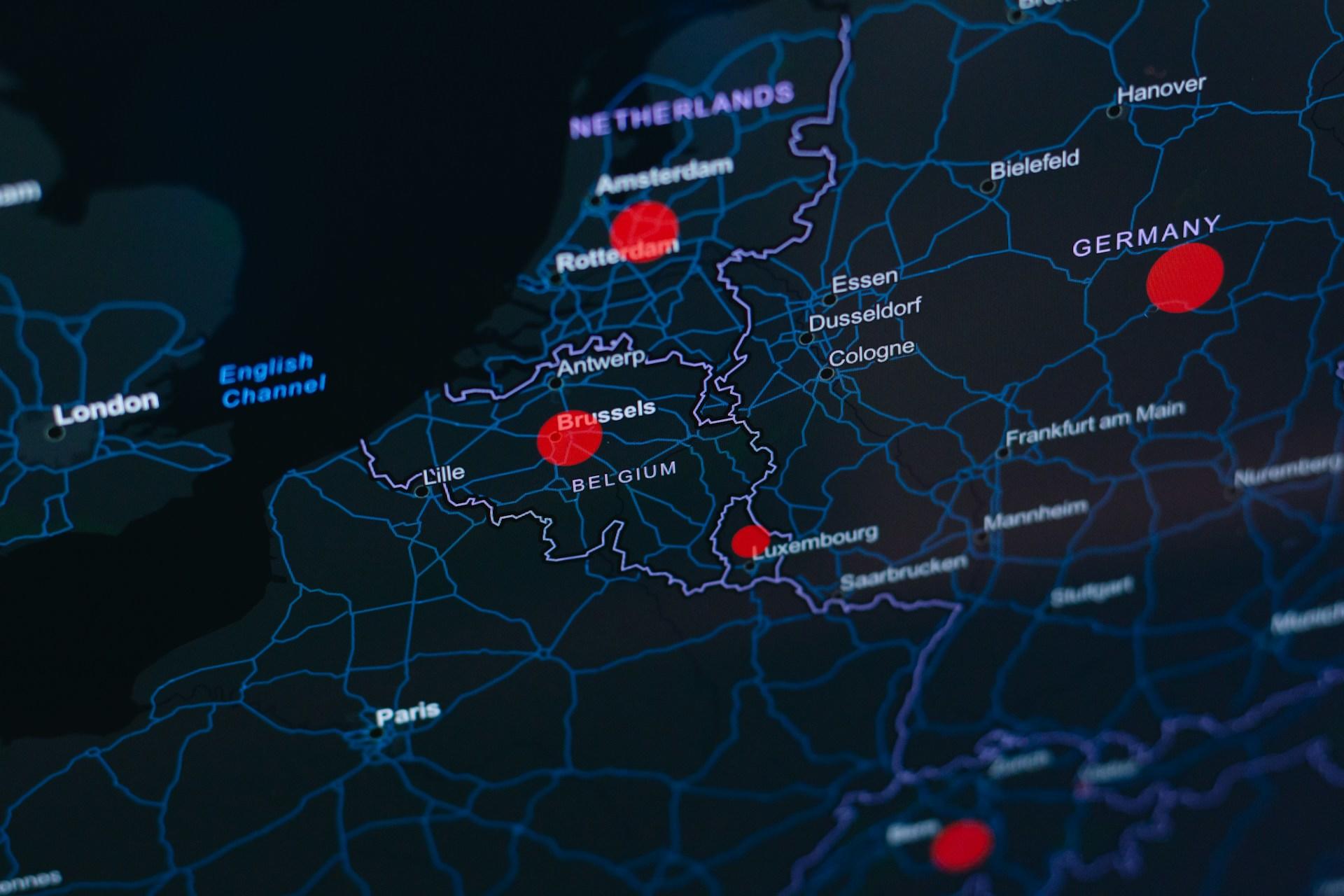French is one of the most influential languages in the world. It's spoken by millions of people across several continents. This is mainly due to France's colonial past, with the country invading and setting up colonies worldwide, particularly in Africa, the Americas, and parts of Asia and Oceania.
Today, millions of people speak French natively, and many speak it as their second language. It is used for international diplomacy, education, and business. It's the second most studied language in the world after English.
Here, we'll look at the French language and which countries speak it.

French at a Glance
The French language belongs to the Romance languages, derived from Latin (and Vulgar Latin, in particular).
This includes similar languages like Spanish, Italian, Portuguese, and Romanian. If you learn French and any of these languages, you'll notice similarities across different words.
There are also lots of similarities between French and English vocabulary. After the Norman Conquest of England in the 11th Century, French was spoken in English, particularly by the aristocracy.
Many French words and phrases (like "déjà vu” and “ç'est la vie”) are also directly borrowed from French into English.
While learning French may present some challenges, such as gendered nouns, irregular verbs, and nasal pronunciation, the practical benefits are undeniable. Once you discover the numerous places where French is spoken, you'll understand why it's a popular language to learn.
Once you learn French, you'll also find it much easier to learn other Romance languages, such as Spanish and Italian.
French-speaking countries in Europe
The first French-speaking country is obviously France, but there are also plenty of fun facts about France. With 64 million speakers, France is still one of the largest French-speaking nations in the world. We'll get to the largest French-speaking nation later, but we can tell you now that it isn't in Europe!
The language is spoken in France and is an official language in several countries neighbouring France. These neighbouring French-speaking countries include Belgium, Switzerland, Luxembourg, and Monaco.
Belgium
Belgium has an approximate population of 11 million, and French is one of the country's three official languages, along with Dutch and German.
Linguistically, the country is mainly divided into two regions: the French-speaking region of Wallonia and the Dutch-speaking region of Flanders.
The French-speaking parts of Belgium were parts of France, particularly during the 18th and 19th centuries, and the linguistic influence can still be felt today.

Belgian French differs from the French spoken in France in some key ways, including in terms of pronunciation and vocabulary.
In Belgium, French is used for official communication, education, and media.
Switzerland
Switzerland has a population of over 8 million people, and like Belgium, it has some fairly distinct linguist regions.
It has four official languages: French, German, Italian, and Romansh. The French language is predominantly spoken in the western part of Switzerland, which borders France. The biggest cities where it is mostly spoken are Geneva and Lausanne.
Luxembourg
Luxembourg is a relatively small country of around 600,000 people. French, German, and Luxembourgish are the official languages here.
Luxembourg is the native language of many Luxembourgers, but French is still extensively used for administrative and legal applications.
Monaco
The principality of Monaco is located on the Mediterranean coast and completely bordered by France.
It's home to around 40,000 people, and French is its official language. However, Monégasque (the native language) and Italian (Italy is just a few kilometres from Monaco) are also spoken and understood.
Other Places in Europe where French is Spoken
French is spoken in places like the Channel Islands of Guernsey and Jersey. These islands are not technically part of the UK or British Territories but are not French. For learners throughout Europe, there are local options, for example french conversation classes dublin that can help you practise spoken French.
They're very close to France geographically, so the language is spoken and understood there, though English remains the official language.
In Vatican City, French is also a language used for official communications and diplomacy, much like it is in many European institutions, including the European Union, the European Court of Human Rights, the European Central Bank, and the European Space Agency.

African Countries Where French is Spoken
Millions of people across Africa speak the French language. French colonisation in Africa during the 19th and 20th centuries led to the widespread use of France in West, Central, and North Africa.
There were already thousands of languages being spoken across Africa before French colonists arrived.
French in West Africa
Following French colonisation, French is spoken in countries like Benin, Senegal, Ivory Coast, Burkina Faso, and Togo, where it is an official language, often alongside other native languages.

French in Central Africa
In Central Africa, Gabon, Chad, the Republic of Congo, and the Democratic Republic of the Congo all use French.
While this is only three-quarters of the country's population (compared to 98% of France being French speakers), the Democratic Republic of the Congo is the largest French-speaking country in the world, with 72 million French speakers.
French in North Africa
In North Africa, countries like Algeria, Tunisia, and Morocco are home to many French speakers, even in places where French no longer holds status as an official language. However, it naturally did when these places were under French rule.
In some of these countries, however, French is still used in business, education, and the media. In these countries, Arabic is the official language.
The French Language in the Americas
The French also colonised parts of the Caribbean and the Americas. French is still spoken in many of these countries today.
Haiti
In the Caribbean, Haiti is a country where French still holds official status and is still used to an extent. We say this to some extent because Haitian Creole is most commonly used in daily life by most people. Haitian Creole is a French-based Creole language spoken by around 13 million people.
Haiti was the first independent nation in the Caribbean, gaining independence from France in the early 19th century.
Canada
The province of Québec, Canada, is mainly French-speaking. Although English and French are the official languages across Canada, only around 22% of the population is French-speaking.

In Québec, there are around 8 million French speakers. Other provinces with notable French-speaking populations include New Brunswick (Nouveau Brunswick),
French Across the Rest of the World
French colonisation didn't stop with Europe, Africa, and the Americas. Like many other European nations, French colonisation reached the farthest reaches of the globe.
French in Oceania
Many Pacific islands were former French colonies, and French is still spoken in some of them. In Vanuatu, for example, French remains one of the official languages alongside English and the local pidgin language, Bislama.
French is also spoken in New Caledonia and French Polynesia, which remain French territories, so technically, France.

French in Asia
The regions of Puducherry and Chandannagar have French-speaking populations, and the language has limited official language status here.
rance returned these colonies to the newly independent nation when India gained independence, but French being spoken in India is certainly an interesting fact.
The Francophone Community
As you can see, French is spoken in many countries. Even in places where it's no longer the main official language, it's still often used or learned as a second language.
There are around 300 million French speakers worldwide, as French is an official language in 29 countries. Collectively, the French-speaking world is known as the Francophonie, and member countries often organise events and initiatives to promote French-speaking culture and the language itself.
Beyond the Francophonie, French is also used internationally for business, diplomacy, and many organisations. We've already mentioned the many European institutions that use French as an official or working language. These include international organisations like the United Nations and NATO and sporting organisations like the IOC, FIFA, and the FIA.
Learning the French Language
If you learn the French language, you will be able to use it in many places around the world.
So, how do you go about learning the language?
There are certainly apps and resources online like Duolingo. You can also learn French through classes in schools and universities or with private tutors.
Private tutoring is one of the finest ways to learn a foreign language, as you'll often be the only student in class. This means you have plenty of opportunities to practise the language, ask questions, and work specifically on the parts of the language that you find most challenging. You can also hire a French teacher on Superprof to get tailored lessons.
While French has many challenging aspects, each student is different, so it helps to work with a private tutor who can tailor each session and lesson to you.
If you want to learn French, it’s good to start with some basic phrases like "s'il vous plaît" (please) and "comment ça va?" (how are you?), which are common in everyday conversation. French grammar may seem challenging, but learning a few key words and phrases will help you make progress quickly.
You can find private tutors on the Superprof website simply by searching for "French" on the homepage.
Summarise with AI:















awesome sauce